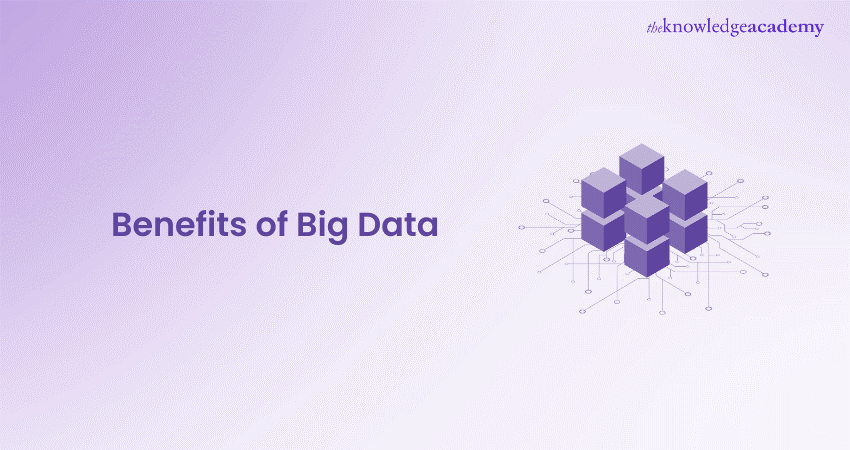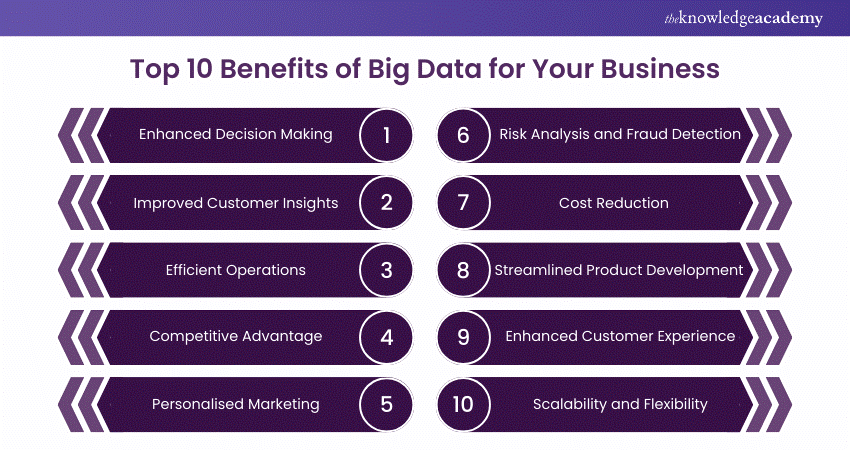We may not have the course you’re looking for. If you enquire or give us a call on +44 1344 203 999 and speak to our training experts, we may still be able to help with your training requirements.
Training Outcomes Within Your Budget!
We ensure quality, budget-alignment, and timely delivery by our expert instructors.

In the modern digital era, businesses generate vast amounts of data daily. This data, known as Big Data, holds tremendous potential for organisations seeking to gain a competitive edge and make data-driven decisions. By analysing and harnessing it, businesses can avail the several Benefits of Big Data and uncover valuable insights that can revolutionise their operations.
According to Statista, the Big Data analytics market is expected to be valued at over 5 billion GBP by 2029. The exponentially growing Big Data market has seen it become a staple resource for businesses to harness, and this is why companies need to be well-versed about the Benefits of Big Data. In this blog, we will explore the top 10 Benefits of Big Data for your business and how it can transform your organisation!
Table of Contents
1) What is Big Data?
2) Top 10 Benefits of Big Data for Your Business
a) Enhanced Decision Making
b) Improved Customer Insights
c) Efficient Operations
d) Competitive Advantage
e) Personalised Marketing
f) Risk Analysis and Fraud Detection
g) Cost Reduction
h) Streamlined Product Development
i) Enhanced Customer Experience
j) Scalability and Flexibility
3) Conclusion
What is Big Data?
Big Data can be defined as the collection of vast amounts of data that are exponentially growing over time. This data is so vast that traditional data processing software is incapable of managing it.
Although the term is new, because of the Benefits of Big Data, it has been in use since the 1990s. Big Data's size constantly moves from a few dozen Terabytes (TB) to many Zettabytes (ZB) of data. This demands techniques and technologies for diverse, complex, massive data sets. The various sources of Big Data include:
a) Social Media
b) IoT Appliance
c) E-commerce
d) Global Positioning System (GPS)
e) Transactional Data
f) Machine Data
g) Customer Satisfaction Feedback
The demand for Big Data professionals is enormous because of the Benefits of Big Data. The Big Data certification will set you apart in the competitive job market, making you an attractive candidate for recruiters.
Top 10 Benefits of Big Data for Your Business

This blog section will expand on the top Benefits of Big Data for consumers and businesses alike.
a) Enhanced Decision Making
This is one of the primary Benefits of Big Data. Big Data empowers businesses to make informed and strategic decisions. By analysing large volumes of structured and unstructured data, companies can identify patterns, trends, and correlations that were previously hidden.
This enables executives and decision-makers to comprehensively understand their operations and market dynamics, leading to more accurate decision-making. With better insights, businesses can optimise their strategies, allocate resources efficiently, and adapt quickly to changing market conditions.
b) Improved Customer Insights
Understanding customer behaviour and preferences is crucial for businesses to tailor their products and services effectively. Big Data Analytics provides valuable insights into customer preferences, purchasing patterns, and sentiment analysis.
By leveraging this information, businesses can personalise their offerings, deliver targeted marketing campaigns, and improve customer satisfaction and loyalty. With enhanced customer insights, businesses can create customer-centric strategies, optimise customer experiences, and build stronger relationships with their target audience.
c) Efficient Operations
Big Data can optimise business operations by streamlining processes and identifying areas for improvement. By analysing operational data, organisations can identify bottlenecks, optimise supply chains, and enhance overall efficiency. For example, in manufacturing, Big Data can enable predictive maintenance, reducing downtime and improving productivity.
In logistics, real-time data analysis can optimise routes and reduce delivery times. By harnessing the power of Big Data, businesses can streamline their operations, reduce costs, and achieve higher productivity levels.
Unlock the power of Big Data Analysis and elevate your skills with our comprehensive Big Data Analysis Training Course!
d) Competitive Advantage
In today's highly competitive business landscape, gaining an advantage is vital for success. Big Data Analytics enables businesses to gain insights into their competitors' strategies, market trends, and customer preferences. By leveraging this information, organisations can make data-driven decisions that give them a competitive edge, helping them stay ahead of the curve.
For example, one of the biggest Benefits of Big Data in the retail industry, Big Data can be used to analyse competitor pricing, identify market gaps, and develop targeted marketing campaigns to attract more customers. By staying informed and proactive, businesses can outperform their competitors and seize new opportunities.
e) Personalised Marketing
Big Data allows businesses to deliver personalised marketing campaigns that resonate with their target audience. By analysing customer data, businesses can understand customer preferences, purchase history, and online behaviour. This information enables them to create personalised marketing messages, recommendations, and offers, resulting in higher conversion rates and customer engagement.
For example, e-commerce platforms can use Big Data to provide personalised product recommendations based on customers' browsing and purchase history. Businesses can enhance customer satisfaction, improve customer retention, and drive revenue growth by tailoring marketing efforts to specific customer segments.
f) Risk Analysis and Fraud Detection
Identifying and mitigating risks is a top priority for businesses. Big Data Analytics can assist in risk analysis by identifying potential threats and detecting fraudulent activities. By analysing vast amounts of data in real-time, businesses can detect anomalies, patterns, and suspicious behaviour, helping them prevent fraud and safeguard their assets.
For instance, financial institutions can utilise Big Data Analytics to identify fraudulent transactions, monitor suspicious activities, and protect customers' financial information. By leveraging Big Data for risk analysis, businesses can enhance security, protect their reputation, and maintain trust with their customers.
g) Cost reduction
Cost reduction is a key objective for businesses across industries. Big Data Analytics can help identify cost-saving opportunities by analysing operational data, supply chain efficiencies, and resource utilisation. Companies can achieve significant cost reductions and improve their bottom line by optimising processes and eliminating inefficiencies.
For example, in healthcare, Big Data analysis can identify opportunities to reduce medical errors, optimise inventory management, and streamline patient care processes. By leveraging Big Data for cost reduction, businesses can achieve operational excellence, allocate resources effectively, and maximise profitability.
Level up your data science expertise and harness the power of Big Data Analytics with our Big Data Analytics & Data Science Integration Course!
h) Streamlined Product Development
Big Data plays a crucial role in product development and innovation. Businesses can gain insights into customer needs and preferences by analysing customer feedback, market trends, and competitor offerings. This information enables them to develop products that align with market demands, leading to successful product launches and increased customer satisfaction.
For example, technology companies can use Big Data to analyse user behaviour, identify pain points, and develop new features and functionalities that cater to their target audience. By leveraging Big Data for product development, businesses can drive innovation, gain a competitive edge, and ensure the relevance of their offerings in the market.
i) Enhanced Customer Experience
Delivering a special customer experience is essential for business success. Big Data enables businesses to understand customer behaviour, preferences, and pain points. By leveraging this information, organisations can personalise interactions, improve customer service, and create seamless customer journeys.
For example, e-commerce platforms can use Big Data to offer personalised recommendations, provide proactive customer support, and optimise website interfaces based on user preferences. This, in turn, leads to better customer satisfaction, loyalty, and positive word-of-mouth, ultimately contributing to business growth.
j) Scalability and flexibility
As businesses grow and generate more data, Big Data technologies allow for seamless scalability. Organisations can handle and analyse massive volumes of data without sacrificing performance.
Additionally, Big Data solutions offer flexibility in terms of data sources. Businesses can integrate diverse data sets from various sources, including social media, IoT devices, and third-party platforms. This enables comprehensive data analysis and provides a holistic view of the business landscape, empowering organisations to make data-driven decisions with a broader perspective.
For example, one of the biggest Benefits of Big Data in the retail industry, Big Data can be used to analyse competitor pricing, identify market gaps, and develop targeted marketing campaigns to attract more customers. By staying informed and proactive, businesses can outperform their competitors and seize new opportunities.
Gain expertise in handling massive datasets efficiently with our Big Data and Analytics Training!
Why Choose Big Data?
Multiple organisations and companies from diverse industries capitalise on the Benefits of Big Data for the following purposes:
a) Improving Operations: Big data Analytics can streamline processes, reduce costs, and increase efficiency by detecting bottlenecks and optimising workflows.
b) Providing Better Customer Service: Analysing customer data helps in understanding preferences and behaviour. This enables the companies to develop more personalised interactions and swift issue resolution plans.
c) Creating Personalised Marketing Campaigns: Leveraging Big Data insights allows companies to create targeted marketing strategies. This helps them reach the right audience with tailored messages, ultimately increasing engagement and conversion rates.
Choosing Big Data is essential for detecting trends and patterns which provides a comprehensive view to predict future success. Additionally, handling diverse types of data (structured, unstructured, and semi-structured) enhances industry effectiveness.
Conclusion
From enhanced decision-making and improved customer insights to cost reduction and streamlined operations, the Benefits of Big Data are substantial. By embracing Big Data Analytics, businesses can gain a competitive edge, drive innovation, and achieve sustainable growth in today's data-driven world.
Take your data analysis skills to new heights with our cutting-edge Big Data and Analytics Training Courses!
Frequently Asked Questions

Big Data is useful because it helps pinpoint ways businesses can enhance operational efficiency and identify solvable problems through enhanced decision-making and greater customer insights.

Five of the most important applications of Big Data are Education, Government, Media and Entertainment, Healthcare, and Cyber Security

The Knowledge Academy takes global learning to new heights, offering over 30,000 online courses across 490+ locations in 220 countries. This expansive reach ensures accessibility and convenience for learners worldwide.
Alongside our diverse Online Course Catalogue, encompassing 17 major categories, we go the extra mile by providing a plethora of free educational Online Resources like News updates, Blogs, videos, webinars, and interview questions. Tailoring learning experiences further, professionals can maximise value with customisable Course Bundles of TKA.

The Knowledge Academy’s Knowledge Pass, a prepaid voucher, adds another layer of flexibility, allowing course bookings over a 12-month period. Join us on a journey where education knows no bounds.

The Knowledge Academy offers various Big Data and Analytics Training, including the Big Data Architecture Training and Data Science Analytics Course. These courses cater to different skill levels, providing comprehensive insights into Big Data Analysis.
Our Data, Analytics & AI Blogs cover a range of topics related to Big Data, offering valuable resources, best practices, and industry insights. Whether you are a beginner or looking to advance your Big Data knowledge base, The Knowledge Academy's diverse courses and informative blogs have got you covered.
Upcoming Data, Analytics & AI Resources Batches & Dates
Date
 Hadoop Big Data Certification
Hadoop Big Data Certification
Thu 23rd Jan 2025
Thu 20th Mar 2025
Thu 22nd May 2025
Thu 17th Jul 2025
Thu 18th Sep 2025
Thu 20th Nov 2025







 Top Rated Course
Top Rated Course


 If you wish to make any changes to your course, please
If you wish to make any changes to your course, please


